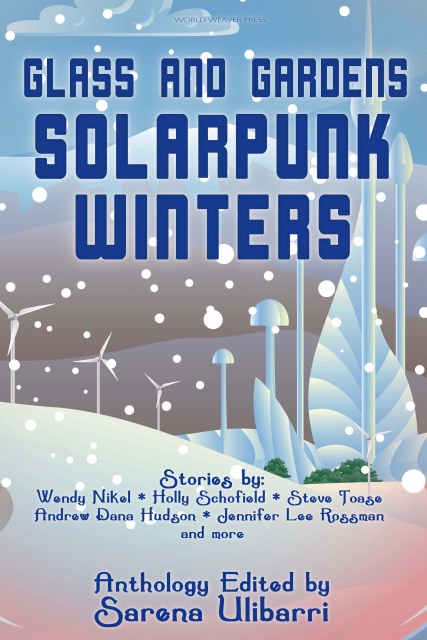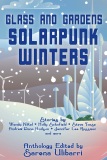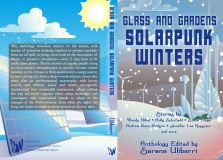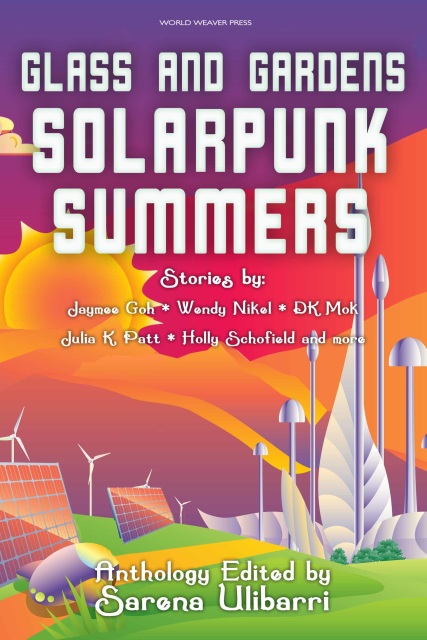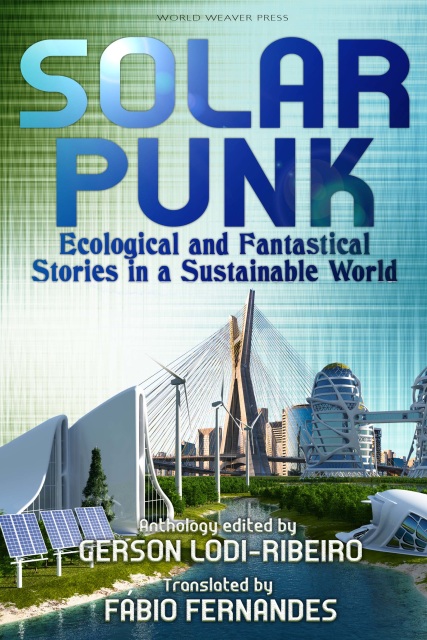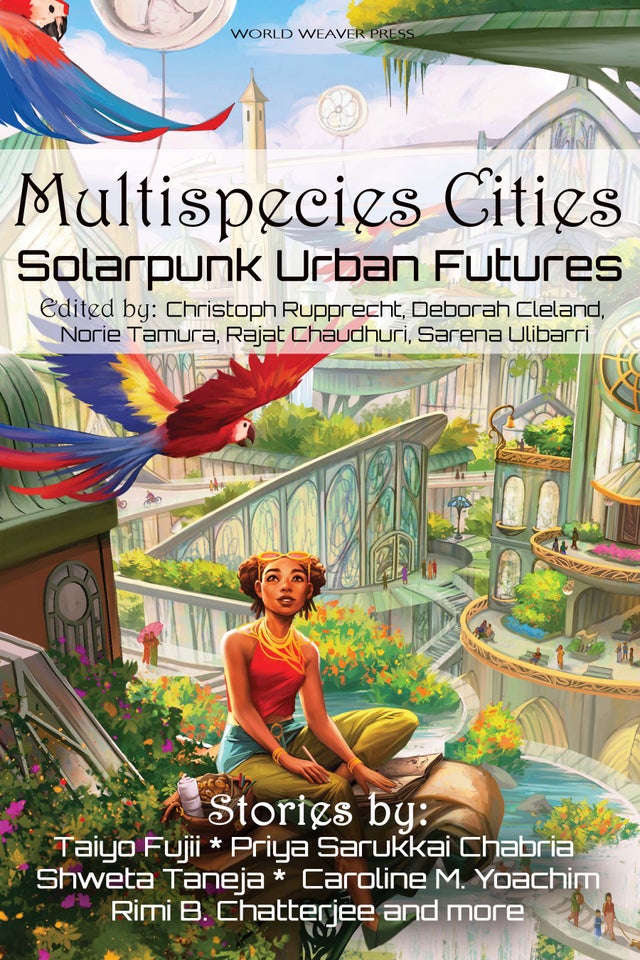- Store
- >
- Trade Paperback
- >
- Glass and Gardens: Solarpunk Winters
Glass and Gardens: Solarpunk Winters
SKU:
$15.95
$15.95
Unavailable
per item
Anthology edited by Sarena Ulibarri
Series: Glass & Gardens
Science Fiction / Short Story Anthology
Release Date: January 7, 2020
Trade Paperback
ISBN-13: 978-1732254688
Anthology: Approx. 95,000 words / 300 pages
Also available as an ebook
Find it Online:
Amazon
Barnes & Noble
Books-A-Million
Goodreads
Independent Bookstores
iTunes/Apple iBooks
Kobo
Library: Overdrive or Bibliotheca
Wholesale: Ingram or direct from [email protected]
Series: Glass & Gardens
Science Fiction / Short Story Anthology
Release Date: January 7, 2020
Trade Paperback
ISBN-13: 978-1732254688
Anthology: Approx. 95,000 words / 300 pages
Also available as an ebook
Find it Online:
Amazon
Barnes & Noble
Books-A-Million
Goodreads
Independent Bookstores
iTunes/Apple iBooks
Kobo
Library: Overdrive or Bibliotheca
Wholesale: Ingram or direct from [email protected]
2 available
DescriptionThis anthology envisions winters of the future, with stories of scientists working together to protect narwhals from an oil spill, to bring snow back to the mountains of Maine, to preserve ecosystems—even if they have to be under glass domes. They're stories of regular people rising to extraordinary circumstances to survive extreme winter weather, to fix a threat to their community's energy source, to save a living city from a deep-rooted sickness. Some stories take place after an environmental catastrophe, with luxury resorts and military bases and mafia strongholds transformed into sustainable communes; others rethink the way we could organize cities, using skybridges and seascrapers and constructed islands to adapt to the changes of the Anthropocene. Even when the nights are long, the future is bright in these seventeen diverse tales.
Table of Contents“Wings of Glass” by Wendy Nikel
“Halps’ Promise” by Holly Schofield “A Shawl for Janice” by Sandra Ulbrich Almazan “The Healing” by Sarah Van Goethem “The Fugue of Winter” by Steve Toase “The Roots of Everything” by Heather Kitzman “Viam Inveniemus Aut Faciemus” by Tales from the EV Studio and Commando Jugendstil “Recovering the Lost Art of Cuddling” by Tessa Fisher “Oil and Ivory” by Jennifer Lee Rossman “Orchidaceae” by Thomas Badlan “The Things That Make It Worth It” by Lex T. Lindsay “Glâcehouse” by R. Jean Mathieu “Snow Globe” by Brian Burt “Rules for a Civilization” by Jerri Jerreat “On the Contrary, Yes” by Catherine F. King “Set the Ice Free” by Shel Graves “Black Ice City” by Andrew Dana Hudson ExcerptsFrom "Wings of Glass" by Wendy Nikel
Karlin had always been fascinated by bees, which is how, when he disappeared, Ginny knew that he’d followed the peculiar buzzing of the mysterious snow-creatures. He’d pointed them out at the first snowfall a week earlier. The tiny, softly-humming machines bobbed upon the wind, and their silvery surfaces blended in with the thick snowfall so that no one—no one except sharp-eyed Karlin—would ever have seen them amid the flurries. Granted, only Karlin and Ginny would’ve even been out in such weather; the winter duties of their two-man engineering team were unenviable. Drifts of snow needed to be cleared away from the solar panels on the converted ski resort so that the community living within it— survivors of the Drought, refugees to higher elevations—would have electricity for furnaces, camp stoves, light-therapy lamps, and water heaters. Ice dams needed broken up. Vents needed cleared. And the great dome of glass arching above the greenhouse needed the snowfall swept from its panes. Karlin stooped there, his waterproof boots positioned along the edge of the glass, squinting down into his mitten-clad hand. “It’s too cold out here to be studying snowflake dendrites.” Ginny slid her broom along the glass and imagined the warmth of the greenhouse below. Constructed from the drained basin of an indoor swimming pool, the sunken garden now seemed to Ginny a mirror-world: a perfect inverse of the mountain’s snow and bitter cold. “This snow’s too dry to form dendrites,” Karlin said matter-of-factly. “Nothing but hexagonal plates today.” Ginny lobbed a flurry of “hexagonal plates” in his direction. “There. Now there’s plenty of crystals on your parka to study later. Let’s get this cleared off so we can get warm.” She was eager for the hot cocoa that’d be waiting for them today—a small indulgence for those willing to brave the cold for the good of the whole community. Karlin smiled. “Too hot, too cold. Why can’t anyone around here just be content?” Ginny rolled her eyes. Only someone like Karlin could get away with joking about the weather after the years they’d endured. They’d all dreamed of snow like this during the long months of scorching temperatures, when the resort-dwellers expanded the building’s lower levels, tunneling deeper into the mountain and creating a network of residences within the cool rock. Now, according to the few remaining meteorologists whose static-lined voices blared from the radio, the jet streams had shifted, and cold Arctic air had whipped its way into their mountains, bringing colder winds and more snow than any of them had seen, even before the days of the Drought. Ginny wouldn’t have noticed the buzzing but for the look on Karlin’s face when she called for an axe to break up some icicles. His face was frozen in bewilderment. “Do you hear that?” he asked. The generators emitted a constant, mechanical hum, but Ginny knew that wasn’t what he was referring to. They’d both been at the resort long enough that its noise was no more noticeable than the pulsing of their blood. “What is it?” Without answering, Karlin reached out over the edge of the roof, his toes inches from a deadly plunge, and captured something in his hand. “What is it?” Ginny repeated. He peered intently into his mittens. “A bee?” The thing in his hand burst upward through the air and he reeled, his boots slipping on the icy shingles. Ginny grabbed his arm and yanked him onto his backside before the wind could toss him from the roof’s edge. Snow fell silently around them, indifferent to their brush with disaster. “It was a bee,” Karlin muttered. Ginny’s breath escaped her lips in frantic puffs of white, and she inhaled deeply, trying to catch it. “No bee could survive in this weather.” “Not a real one,” Karlin argued. “It was silver. It looked like it was metal and glass.” “You’re seeing things. The snow’s brightness is messing with your vision.” “I know what I saw.” With a scowl, he pushed himself to his feet and tromped to the ladder on the roof’s edge. As he climbed downward, disappearing below, Ginny knew she hadn’t heard the last of the bees. From Oil and Ivory by Jennifer Lee Rossman If my grandmother were alive, she’d laugh at me for worrying about how thick the ice is this winter, having grown up in a time of dwindling ice caps and sad polar bears. Her generation thought we destroyed the planet, doomed it to a hot, melty fate. That was true for a while, but climate change doesn’t always mean global warming; sometimes it just means more extreme seasons. Up here off the coast of Greenland, summers are mild enough that grass replaces snow and we have to migrate inland when the ice melts, but in winter? In winter, pack ice extends clear across to Canada, just endless miles of white-blue as far as you can see. I stand at the coastline, huddling in my parka and staring down at the ocean a few feet below. I’d hoped it wasn’t as bad as we thought, but I have long ice cores from all over the migration route that prove otherwise. My parka, black to absorb the sun’s heat, is lined with bio-engineered moss grown to insulate better than any fur, so I can’t pretend the chill that goes through me is anything but dread. The ice is too thick. The whales are going to suffocate. I blink away tears for fear of them freezing. Crying is only for home, my dads say. At home, you can cry, but you have to be strong out in the cold. I usually don’t have trouble with that, but I guess being pregnant is making me more emotional. The narwhals travel this way every year, but they can only swim so far without surfacing to breathe. If they can’t break through the ice… Now I’m the one having trouble breathing. “Okay, Malina,” I say to my baby, my words hot in my face mask. I don’t know if her ears have developed yet, but she’s been a good listener these past five months. “The ice is a problem, but the whales aren’t here yet, so we have time. Your momma will make it better. She just has to break holes in the ice.” Except the holes my corer drills are far too small. The narwhals need a foot and a half minimum diameter to fit their entire heads through, and they need one every half mile. It’ll take forever to reach the open sea up north. In the bay a little ways north, that damned oil rig juts up against the horizon, a black smear ruining the scenery as well as the environment. It was grandfathered in when they banned drilling, because it’s been there for decades. Never mind that my people and the animals have been here since before the first white man discovered oil and decided this land was theirs to destroy. But I bet they have equipment we could use to drill through the ice. Our relationship with the miners is less than stellar—we trade our biomoss clothes for their sustainably sourced rations a couple times a year, but they want us gone so they can expand and we want them gone because they’re killing the planet. But we’re civil with each other…ish. It’s been a while since anyone punched anyone, is my point. From "Black Ice City" by Andrew Dana Hudson The blue harvest is good this year, kelp growing in straight ropes as thick as my head, dulse bushes meat-red in the angel light of the balmy Barents Sea. We keep waiting for storm waves to rip our crops away, to carry the ripest fronds down to carbon trenches—but they never come. So day after day, Zhi Ruo and I pull up seaweed and full racks of mussels and scallops, plumped on the fat plankton of the New North Gyre. It’s a fine season, watching Zhi Ruo’s long legs slide in and out of the water, her shoulders taut and strong from lifting what we’ve grown. Shells clatter on the deck, a bounty, and I feel a greedy excitement at the luxe adventures they’ll earn me at autumn’s end. Zhi Ruo pouts when I tell her I’m drifting north for the party this year. “Come where the sun is, Gillam, you masochist,” she says. But I’m set. Four years since I last made Black Ice City, and in that lifetime I’ve become, I fancy, the type of strapping, worldly man I’d once seen turn heads skating across the floe. I take Zhi Ruo to bed every night for a week, and then slip out one lightless morning, untie my boat from hers, raise sail and set course for the white-specked horizon, against the tide of migrating birds. *** In Svalbard I find new comrades. To join the winter party, one must bring ice, and to wrangle ice of any consequence one needs more than a single boat. So I hobnob in Barentsburg hostels, buying drinks and trading planktonspice until I win the favor of seven rough men out of Yuzhny. They’re Irish and Icelandic, Spanish, Dutch and Saharan, all drawn north to seek their fortunes in one unlikely way or another. They pilot bedecked new cutters, fresh from Hokkaido factories, hulls too clean to have run the Northwest Passage. “What’s the story there?” I ask, more than once, but they laugh and dismiss me. The Spaniard, Mateo, grins. “Sometimes boats fall off the back of other boats.” About the AnthologistSarena Ulibarri is Editor-in-Chief of World Weaver Press, and she is also a fiction writer who has been published in magazines such as Lightspeed, GigaNotoSaurus, and DreamForge, as well as anthologies such as Biketopia: Feminist Bicycle Science Fiction Stories in Extreme Futures and The Gamer Chronicles. She lives in a solar-powered adobe house in New Mexico, and can be found online at SarenaUlibarri.com and @SarenaUlibarri.
|
More Like ThisPraise"Each of these stories features a wintry, inhospitable setting occupied by tenacious survivors and innovators, and an emphasis on LGBTQ representation and female empowerment runs through each of these visions for more progressive futures…readers will take comfort in this wide range of snowy, hopeful tales."
--Publishers Weekly "I’d especially recommend Glass and Gardens: Solarpunk Winters to anyone who wonders what the future might hold for humanity." --Long and Short Reviews "What I found most intriguing was that no one gave up. They found other ways to do things. They hid in shelters, grew their own food, and still found joy in life…I found it to be an enjoyable read." --The Book Faerie "Glass and Gardens: Solarpunk Winters is another excellent addition to solarpunk literature…The tales of this volume are individually very strong and also add together in a pleasing and meaningful way…a lovely, rewarding read." --The Future Fire "With its wildly diverse set of narrators and different imaginings of a frozen future, science fiction fans and readers new to the genre will both get lost exploring the worlds presented inside. This anthology gives readers a small taste of the work by almost twenty talented authors, all providing an optimistic view of a potential catastrophe." --Reader Views "Glass and Gardens: Solarpunk Winters puts into narrative the most important changes we could make: cutting edge advancement in our relationships to each other. The stories show that people can adapt to anything, even kindness. That is what our future will need most as we come together to share warmth." --Rob Cameron |

